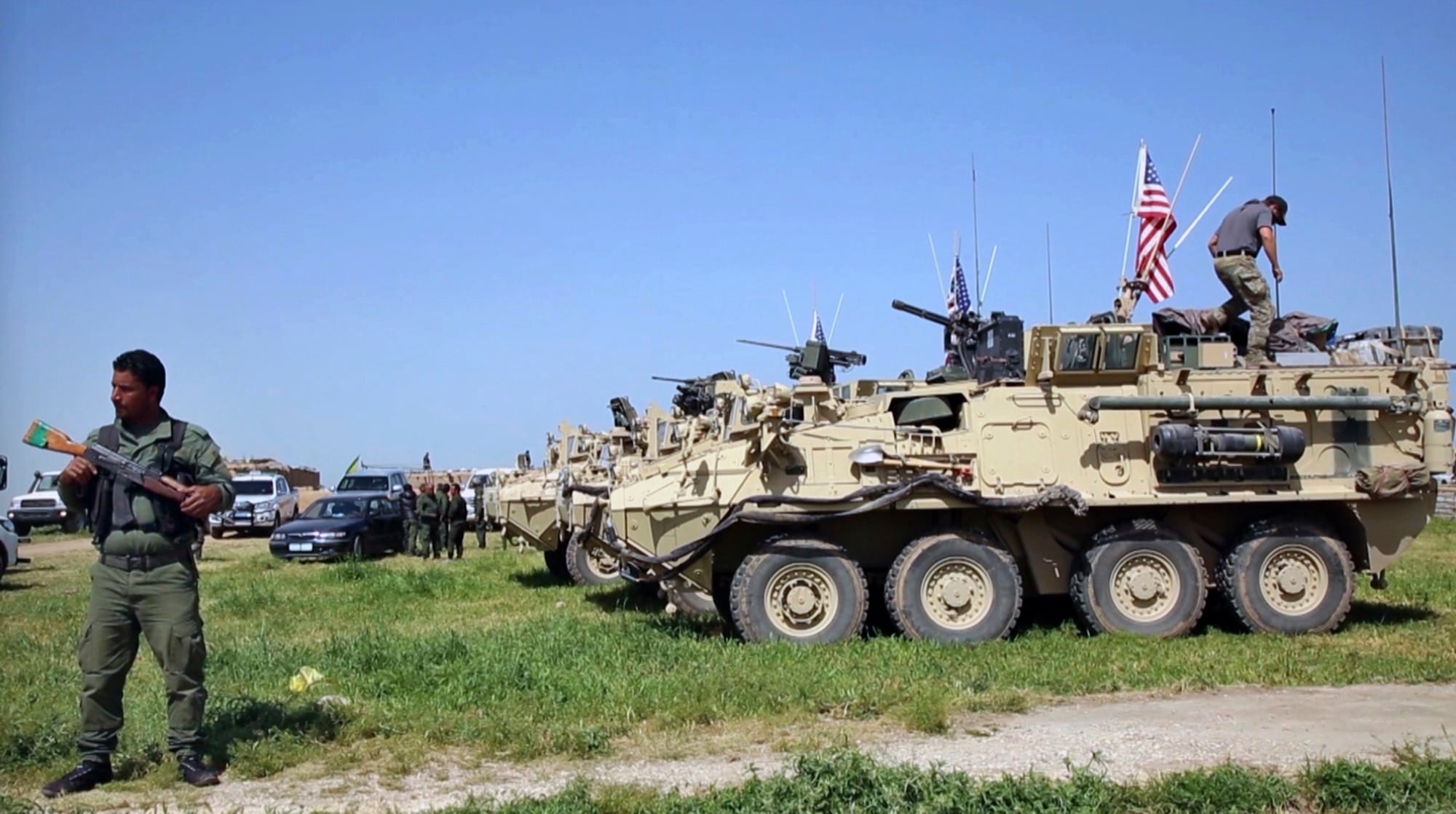U.S. Stryker vehicles led a convoy of Kurdish reinforcements into the embattled Syrian city of Raqqa, according to Kurdish activists on the ground and videos posted on social media by the SMART News Agency— the largest Syrian opposition news outlet.
The videos shed light on the extent of the direct support of U.S. forces in the fight against ISIS in Syria.
In early June, Military Times reported U.S. special operations forces were assisting Kurdish partner forces, the Syrian Democratic Forces, on the ground inside Raqqa as they attempted to liberate the city from ISIS.
Col. Ryan Dillon, the spokesman for Operation Inherent Resolve, said at the time that those special operations forces were not in a direct combat role, they were there to advise and assist partner forces. They are "supposed to go to the last cover-and-concealed position from the front line of advance of the partner force," he said.
The videos, uploaded July 6, show U.S. Strykers entering the outskirts of the city of Raqqa at the head of a convoy of U.S. up-armored Humvees driven by Kurdish allies.
Roughly 300 meters separates us from other forces in the city, Tamir Hussein, a field commander for the Syrian Democratic Forces, can be heard saying in Arabic in the video. It was not clear whether he was referring to enemy or friendly forces.
Army Stryker vehicles carrying U.S. flags were seen in April conducting presence patrols in northern Syria and Iraq after Turkish warplanes struck Kurdish allies. Those patrols were designed to provide a visible presence of U.S. forces to highlight America's support and protection for its allies, according to officials at the Pentagon. The recent video posted by SMART shows no U.S. flags.

A Kurdish fighter with the People's Protection Units stands guard as U.S. forces take up positions in the northern village of Darbasiyah, Syria, in April. The U.S. moved troops and armored vehicles through several Syrian cities and towns in a show of force to dissuade Turkish and Syrian Kurdish forces from attacking each other.
Photo Credit: AP Photo via APTV
U.S. Kurdish allies have entered the second month of fighting to liberate ISIS' de facto capital. After rapid early gains by Kurdish forces, the fight, as expected, has turned into intense street by street urban combat. Nearly 2,000 ISIS fighters are holed up in the city.
Backed by U.S. airpower, Kurdish forces on Monday breached the Rafiqa wall surrounding the Old City of Raqqa.
"The SDF are exerting pressure on ISIS from four different fronts throughout the city," said Canadian Brig. Gen. D.J. Anderson, OIR's director of partner force development. "The fight in Raqqa is going well, but we know there will be tough days ahead. However, I'm confident that our partner forces are up to the task."
The coalition has trained roughly 8,500 SDF forces, he said, "and just this year have delivered weapons and ammunition and over 400 vehicles and personal equipment for over 40,000 troops."
U.S. aid to the Kurdish-led SDF has been a contentious issue with U.S. NATO ally Turkey, which views the organization as an armed Syrian branch of the Kurdistan Worker’s Party, an internationally designated terrorist group. PKK insurgents have terrorized Turkey for decades in a battle for Kurdish autonomy on southeastern Turkey.
The Pentagon has been tight-lipped about the specifics of weapons and armored vehicles the Kurds are receiving from the U.S. Members of the SDF already drive Guardian armored personnel carriers built by International Armored Group. These vehicles were supplied to the Syrian Arab Coalition — a coalition of Arab fighters within the SDF — months ago.
The appearance of SDF fighters driving newly up-armored U.S. Humvees is a new development. Kurdish fighters have in the past used U.S. Humvees they captured on the battlefield, but never directly supplied by the U.S. Videos of U.S. armored tactical vehicles being shipped to Kurdish fighters in Syria were uploaded and spread by Kurdish supporters and activists on social media.
Military Times has reached out to officials at Operation Inherent Resolve about the supply of U.S. up-armored Humvees to Kurdish fighters, but received no response.
According to the Syrian Observatory for Human Rights — a human rights watchdog group covering the Syrian conflict — Kurdish fighters backed by coalition airpower were responsible for the deaths of nearly 224 civilians, including 38 children, in the first month of fighting to liberate Raqqa. Coalition aircraft launched nearly 641 airstrikes in the month of June alone, according to figures provided by OIR.
The citizen journalist group, Raqqa is Being Slaughtered Silently, which formed to document ISIS atrocities in Raqqa, characterized the strategy by coalition and Kurdish partner forces as "one of destruction and displacement."
"Their methods rely mainly upon intensive daily aerial bombardment and artillery shelling," the group said on its Facebook page. "These practices cause dozens of civilian deaths every day, as well as contribute to a massive destruction of infrastructure, properties, residential buildings and places of worship."
The journalists comprising the organization have been marked for death by ISIS for several years, and at least one of the reporters has been killed by ISIS militants.
Shawn Snow is the senior reporter for Marine Corps Times and a Marine Corps veteran.




